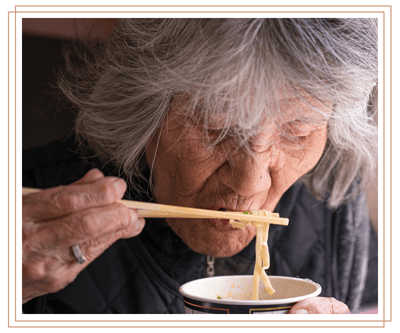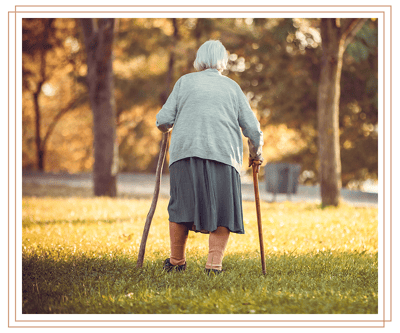Identifying the best way to provide care and support for an aging or elderly parent is one of the most difficult tasks families can face.
Assisted living offers support to those who are in need of assistance. Assisted living communities offer apartment-style living options that allow your parents to live in a home-like environment while receiving assistance with activities of daily living.
In addition to the personal care support your loved one can receive in an assisted living community, a variety of activities, programs, outings, and dining options are also available.
Some parents will welcome the idea after some discussion, while other parents might object to the idea of moving to assisted living.
If your family is in the beginning stages of discussing providing more support for an aging loved one, but aren’t sure if it’s time to consider a long-term care option like assisted living, this eBook covers the most common signs it’s time to take a closer look.

Recognizing the signs it’s time to start considering assisted living is the first step. But in reality, finding the right community for a parent can take some time. Early recognition of the most common signs it’s time to start a long-term care search can help your family prepare.
Dad had always been the man of the house. He still is. Only now, the house is empty. At first, things were fine, but over time that changed.
I missed the subtle changes — like the fact that he had gotten to the point where showers were far and few between. Or that the late fees were adding up every time he forgot to pay the bills.
When he stopped driving, things went downhill fast. My outgoing, witty, fun-loving dad now spent most of his days alone, moving from the bed to the couch to the chair and back to the bed again, and his mood began to change. Reliant on others in a whole new way, he didn’t like it. His patience grew thin, and so did mine."

Activities of daily living (ADLs) are the basic activities necessary for living independently and often the most obvious sign it is time to consider a long-term care option. Activities of daily living include:
Hygiene can be a really sensitive subject. If you have noticed a decline in your parent’s hygiene habits, but aren’t sure how to approach the conversation, try downloading our personal hygiene checklist.

It’s not always easy to spot a poor diet in an aging adult. Although there might be a sudden weight loss or gain, the early warning signs of poor nutrition can be easily overlooked.
A survey by Ross Laboratories found that 30 percent of seniors skip at least one meal a day, and 16 percent of seniors consume fewer than 1000 calories a day, which is insufficient to maintain adequate nutrition.
Proper nutrition affects mood, physical health — including the ability to ward off illness — and energy level. Simple tasks like shopping or preparing meals can become increasingly difficult the older we get.
Coupled with the fact that nearly 50 percent of aging parents say they’re worried about being a burden to their children, and they may not ask for help to get groceries or prepare meals, these early warning signs it might be time for assisted living can go undetected.
Eighty-seven percent of older Americans have a chronic disease that could be improved through better nutrition, according to the U.S. Administration on Aging.
If you’re looking for a short-term solution, helping a parent plan meals weekly is one way to decrease stress and prevent a quick trip to the pantry for a snack that lacks nutritional value.
Try this Meal Planning Worksheet to plan for a week of healthy meals, and make a grocery list.
Assisted living dining programs can offer nutritious, delicious meals. With restaurant-style dining options, the burden of shopping and meal preparation is eliminated, and seniors often have a wide variety of options to choose from.
The social benefits of dining in an assisted living community are worth mentioning, also. Not only do seniors get the nutrition their bodies need, but they can do so while enjoying the company of others.
If your parent has significantly lost weight, gained weight, lacks energy, has had a significant change in their mood, or appears to be sick more often, nutrition may very well be the common denominator and a reason to consider assisted living.
 Getting married, having children, and owning a home are often goals you have as you get older. Later into adulthood, you learn to regularly manage lawn care, housekeeping, and you pay bills every month — often without thinking how complex these tasks can really be.
Getting married, having children, and owning a home are often goals you have as you get older. Later into adulthood, you learn to regularly manage lawn care, housekeeping, and you pay bills every month — often without thinking how complex these tasks can really be.
Managing a home alone can become a big task the older you are. Lawn care, housekeeping, and paying bills on a monthly basis are activities we don’t put much thought into when we are younger, but as we age, these complex tasks can prove to be challenging for a variety of reasons.
Forgetfulness, limited financial resources, depression, or physical limitations can make handling these everyday tasks burdensome.
If your dad’s once perfectly groomed lawn is now overrun with weeds, or the same bills you saw on your last visit are in a pile on the kitchen counter, these may be early signs that home ownership is becoming more challenging for your parent.
While hired help can lessen the burden of lawn care or housekeeping, they add additional monthly bills to be paid. And this doesn’t take into consideration that you’ll be paying another bill to provide in-home care to a parent if they need assistance living at home. Assisted living costs can vary from community to community, but many communities provide housekeeping, lawn care, and utilities (such as water, sewer, and garbage) as part of their monthly fee.
Although cost is far from the only factor that should be considered when deciding between home care and assisted living, it certainly is an important one. You might be a bit surprised when you see the monthly cost of an assisted living apartment but comparing the two isn’t an apples-to-apples comparison.
Expired food, excessive clutter, and signs pets are being neglected can also indicate it might be time to consider assisted living. Some assisted living communities are pet-friendly, and others actually offer assistance caring for pets by walking or feeding them regularly.
 Remember what it was like getting your driver’s license for the first time? The independence you felt? Rather than relying on parents, family members, or friends to get around, a driver’s license gave you the freedom to go to and from work, get a haircut, make a bank deposit or meet friends for dinner or a movie.
Remember what it was like getting your driver’s license for the first time? The independence you felt? Rather than relying on parents, family members, or friends to get around, a driver’s license gave you the freedom to go to and from work, get a haircut, make a bank deposit or meet friends for dinner or a movie.
Losing the ability to drive can be devastating. It can have a significant impact on your confidence, and it can dramatically decrease your ability to socialize. Loneliness and isolation have been linked to poor sleep and depression.
A study by Forbes found that social isolation or loneliness in older adults is associated with a 50% increased risk of developing dementia, a 30% increased risk of incident coronary artery disease or stroke, and a 26% increased risk of all-cause mortality.
For many seniors, making the move to an assisted living community is not only a new beginning with easy access to make new friends, delicious meals, and purposeful activities, but for assisted living communities that offer transportation services, it can also be an escape from the fears and worries that can accompany living at home alone.
Many people find that they have more freedom in assisted living to enjoy their hobbies and interests than they did living at home. Surrounded by people their own age, residents become part of a loving, supportive community, and an ongoing schedule of activities makes it easy to get connected, develop a new hobby or interest, and stay active.

Managing medications alone can become more difficult as you age. Memory loss or forgetfulness, an increase in the number of medications taken, changes in dose, and complex medication schedules can be a lot for one person to handle.
One in five seniors who are prescribed five or more medications have difficulty managing them, and the average number of medications senior citizens take ranges from nine to thirteen.
While mismanaging medications is typically an accident, in some cases, medications are mismanaged intentionally because of rising prescription costs leaving some seniors to choose between skipping doses or cutting pills in half to save money.
With conventional medicine typically leading the way in care and treatment plans for aging older adults, the increased number of medications the average senior citizen takes is alarming.
Conventional medicine addresses illness or ailments using pharmaceutical drugs, surgery, or medical treatments. Having a family member set up medications for an aging loved one can prevent taking too much or too little of prescribed medication. Without training or medical knowledge, it can be difficult to know when to question if your loved one has been prescribed too much medication, if medications are causing adverse reactions and harming your loved one more than they are helping them, or if there are alternative ways to manage your parent’s health without always having to add a new medication.
This is where assisted living communities can be extremely helpful - particularly communities that practice a holistic approach to care and who might be able to find alternative ways to help your loved one live a happier, healthier life.
Take chronic pain, for example. Chronic pain is among the most common diseases in the United States and worldwide. Some assisted living communities have found ways to provide pain relief with holistic approaches. These approaches can reduce the amount of medication and sometimes eliminate the need for it altogether.
Medication management is a key benefit of living in an assisted living community. Access to a nurse can give you a built-in advocate and someone who can see the big picture.

About 36 million older adults fall each year, but fewer than half tell their doctor. And falling can pose some serious health risks.
According to the National Council on Aging, every 11 seconds, an older adult is treated in an emergency room for a fall. Every 19 minutes, an older adult dies from a fall.
If your loved one has fallen before, it’s likely that they’re afraid of falling again. Even if they haven’t fallen, they’ve probably heard stories of someone who fell, broke their hip, and never recovered. To cope with the fear and anxiety, some seniors might avoid walking outside of the home unassisted or avoid leaving the home altogether. This proves to be problematic. By limiting physical activity for fear of falling, you actually increase the risk of falls.
Doing strength and balance activities at least three times a week will help by making muscles stronger and joints more flexible, but being motivated or confident enough to do so when you live at home alone is a common challenge.
Assisted living communities are known for their focus on fall prevention programming. From walking clubs to sit-ercise classes, yoga, tai-chi, and more, living in an assisted living community can help your loved one gain strength and confidence.
Throw rugs, poor lighting, and stairs aren’t the only dangers to your parent’s safety. Take a look at this home safety checklist to learn more.
Making the decision to consider assisted living for a loved one isn’t an easy one. For each family, the determining factors may look very different. Fortunately, families often learn that assisted living can provide an opportunity for a new beginning and can actually improve the quality of life their loved one has.
If your loved one is experiencing any of the challenges outlined in this eBook, starting your research early can prevent your family from having to make a decision during a crisis and can allow you time to learn more about your parent’s wishes.
